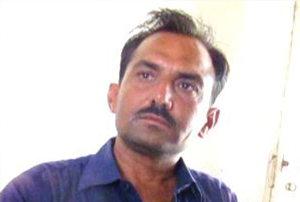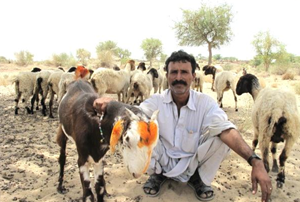Muhammad Wasan and his fellow villagers at Malsario, a settlement in union council (UC) Peelo, taluka Nagarparkar, district Tharparkar at Mithi, got their livestock vaccinated after the awareness campaign regarding citizen engagement with state institutions and the existing complaint redress mechanisms by the Sindh Rural Support Program (SRSP) – a not-for-profit organization based in Sindh, implementing a USAID funded intervention in the desert district of the Mirpurkhas division.
Awarded under the USAID Citizens’ Voice Project – a $45 million, first of its kind, democracy and governance initiative in Pakistan – the SRSP grant was aimed at creating awareness among people for strengthening transparency and accountability mechanisms. This would enable citizens to identify problems and pursue resolutions in accordance with the prescribed processes.

SRSP gave Malsario and the adjoining villages the awareness that helped not only the people of Malsario but other villages as well to get their livestock vaccinated for many veterinary diseases. This practice would result in saving a huge post-outbreak veterinary expense and ensure a safe livelihood and more productive livestock.
“We were already working for development and betterment… but the knowledge SRSP brought us was true enlightenment,” says Wasan who attended the UC-level awareness workshops and trainings for non-governmental and community-based organizations, including local support organization (LSOs) organized by SRSP. It led to the initiation of an application process that eventually led to 121 livestock of village Malsario to be vaccinated. SRSP also organized dialogues between citizens and public institutions, brought in creative street theatre performances for communication purposes, and even engaged local members of the Provincial and National assemblies. On UC-level, SRSP ensured bringing local stakeholders onboard, chiefly local community organizations. Muhammad Wasan heads one such LSO in UC Peelo, i.e., Ekta (unity).
“Even a box of matches that we buy has a tax-share that goes to the public servants’ salary,” Wasan emphasizes, adding, “It is not our privilege, but our right to have our problems resolved swiftly and in a timely manner.” Maan Singh, a peasant and a member of a scheduled caste within the Hindu community and a fellow villager of Wasan, agrees to what his village leader opines.

Wasan along with Maan Singh, Prabhulal Miya Ram, Mohan Bhagat, Moro Agyo, Satram Kheero, Nisar Abbas, Sawai Daya Ram, and Poonam Chand were among the few who submitted an application to the Director Animal Husbandry at his district head office in Mithi. “From Dabo to Serohi, 18 villages were visited by the livestock vaccination team only because of one small step that we took,” says Maan Singh. “My son thought applications could only get us a day off of school,” says Nisar Abbas, who is from Soondar, an adjoining village.
These local activists got at least 1800 animals vaccinated (at an average rate of 100 livestock per village) due to their successful citizens’ engagement. “We are now discussing other problems that could attract the relevant authorities,” says Wasan with a firm voice. “Water is our next priority,” others murmur.




















